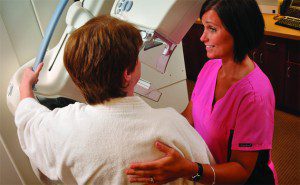

Cancer, no matter the type, is the most feared disease in the 21st century. It is estimated that one woman in eight will develop cancer during their lifetime. With around 290,000 new cases each year and an estimated 39,000 women dying from breast cancer this year, education concerning this disease is vital for everyone.
Breast cancer typically produces no symptoms when the tumor is small and most treatable. Therefore, it is very important for women to follow recommended screening guidelines for detect¬ing breast cancer at an early stage, before symptoms develop. When breast cancer has grown to a size that can be felt, the most common physical sign is a painless lump. Sometimes breast cancer can spread to underarm lymph nodes and cause a lump or swelling, even before the original breast tumor is large enough to be felt. Less common signs and symptoms include breast pain or heaviness; persistent changes to the breast, such as swelling, thickening, or redness of the breast’s skin; and nipple abnormal¬ities such as spontaneous discharge (especially if bloody), erosion, inversion, or tenderness. It is important to note that pain (or lack thereof) does not indicate the presence or the absence of breast cancer. Any persistent abnormality in the breast should be evaluated by a physician as soon as possible.
Screening guidelines for various cancers are often confusing because there are several organizations issuing them. When in doubt, stick to recommendations by the most respected groups like the American Cancer Society, American College of OBGYN, and the American College of Surgeons.
Breast Self-Exam (BSE)—Every woman 20 years old and older should learn a proper technique for self breast exam by a health care professional. It is ideal to perform BSE monthly but women should be cautioned that most breast cancers cannot be detected on exam. Therefore any breast abnormality should be reported to your health care provider.
Clinical Breast Exam (CBE)—For women in their 20’s and 30’s a CBE by a health care professional is recommended at least every 3 years. In women 40 and older the recommendation is yearly, preferably prior to yearly mammogram.
Mammogram—Mammography is the only imaging modality recommended for routine screening for breast cancer. Most organizations recommend yearly mammographic screening starting at age 40 (earlier if there is a family history of breast cancer). There is no age limit when screening should cease. Screening should be individualized and based on overall health status and life expectancy.
Some patients fear the radiation exposure from mammograms. The exposure is actually relatively low and the benefits of screening outweigh any potential harm. The radiation exposure from a mammogram is approximately 1/16th that of a chest CT scan.
You can feel comfortable in having your mammogram done at NDIC. The Radiologists at our Imaging Centers are highly trained and are the most respected Physicians in the field of mammography. NDIC performs over 20,000 mammograms annually, so we pride ourselves in helping women detect breast disease, as well as, help them through the processes of getting treatment if needed. With the use of digital imaging and computer-aided detection (CAD), NDIC can image the interior of the breast with a high rate of accuracy. We use only state-of-the-art equipment and are certified and accredited by the American College of Radiology and the FDA. Both the Radiologist and Technologist at NDIC maintain the highest level of training in the area mammography.
Lower Your Risk of Developing Breast Cancer
There is no sure way to prevent breast cancer. But there are things all women can do that might reduce their risk and help increase the odds that if cancer does occur, it is found at an early, more treatable stage.
You can lower your risk of breast cancer by changing those risk factors that are under your control. Body weight, physical activity, and diet have all been linked to breast cancer, so these might be areas where you can take action.
Regular physical activity: Physical inactivity may be relaxing, but its consequences are often deadly. Practicing as little as 1 hour and 15 minutes to 2½ hours of brisk walking per week reduced the risk by 18%. In addition, exercise fights against the signs of aging. Not only is exercise able to help prevent formation of new cancer cells, but it may also kill cancer cells in their genesis. Whether you are a breast cancer survivor, at risk for developing the disease, or just want to try to prevent it, exercise is beneficial for you.
Maintain a healthy weight: Obesity (being overweight) increases the risk for numerous diseases including breast cancer. Being overweight, especially after menopause, is associated with carcinogenesis of the normal cells of the breast. This risk is higher if the extra weight is carried around the waistline.
Avoid alcohol and tobacco use: The risk of breast cancer is considerably higher with consumption of alcohol and tobacco. Even moderate consumption of alcohol and second hand smoking can increase the risk of breast cancer. In addition to breast cancer, regular consumption of alcohol and tobacco increases the likelihood of developing other forms of cancer.
As breast cancer continues its destructive path, researchers remain busy discovering more about the disease and how to minimize its effects. Currently, there are support centers and medications aiming to eradicate the disease. It’s important for you to be in good hands. Would you like to know more about breast cancer screening and detection? The experienced and friendly radiologists and staff at NDIC are available to answer any questions you have about breast cancer screenings. Feel free to call the office at 239-593-4222 to discuss any health concerns you may have.
Naples Diagnostic Imaging Center
239-593-4222
www.NaplesImaging.com
 Southwest Florida's Health and Wellness Magazine Health and Wellness Articles
Southwest Florida's Health and Wellness Magazine Health and Wellness Articles
